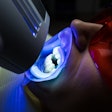The U.S. Food and Drug Administration (FDA) has approved Botox injections (onabotulinumtoxinA) to prevent chronic migraine headaches in adult patients, the agency announced.
To treat chronic migraines -- those that last more than 14 days in a month -- Botox is given approximately every 12 weeks as multiple injections around the head and neck to try to dull future headache symptoms. Botox has not been shown to work for the treatment of migraine headaches that occur 14 days or less per month, or for other forms of headache.
The most common adverse reactions reported by patients being treated with Botox for chronic migraine were neck pain and headache, the FDA noted.
OnabotulinumtoxinA, marketed as Botox and Botox Cosmetic, has a boxed warning that states the effects of the botulinum toxin may spread from the area of injection to other areas of the body, causing symptoms similar to those of botulism. Those symptoms include swallowing and breathing difficulties that can be life-threatening.
There has not been a confirmed serious case of spread of toxin effect when Botox has been used at the recommended dose to treat chronic migraine, the FDA said.
Copyright © 2010 DrBicuspid.com



















